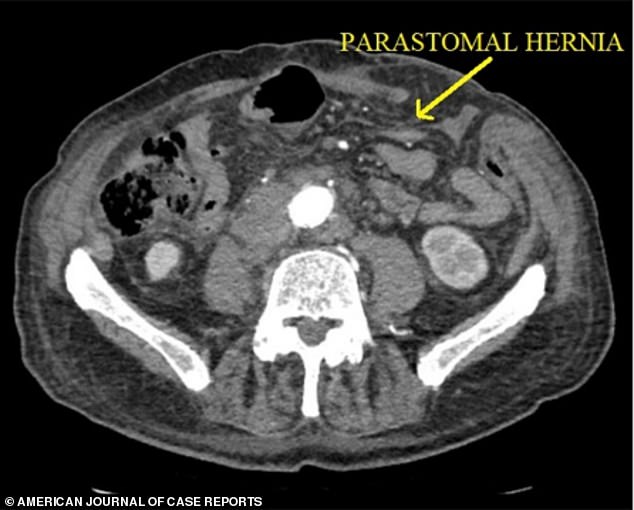A man was rushed into emergency surgery after his colon ‘spontaneously’ exploded out of his abdomen following a common surgery.
The 83-year-old suffered a ‘spontaneous evisceration’ of his small intestine – when parts of the intestines burst outside of body – following a hernia repair.
Over three feet of his small intestine had burst through a two-inch hole in the skin due to the hernia, when parts of an organ bulge through a weak muscle or tissue.
The protruding bowel had also become twisted, cutting off crucial blood supply.
Though evisceration of the bowel is rare, hernias strike 5million Americans a year. Over 1million hernia repairs are performed a year, making it one of the most common operations in the US.
Recent similar cases have included patients whose intestines burst through their body because they coughed too hard or suffered trauma like a stab wound.
However, the Romanian man’s doctors said he had no history of coughing fits or trauma, though he had multiple hernias.
It’s estimated no more than 100 cases of evisceration have been reported in medical literature, and cases like the unnamed man’s have been seen just a handful of times, the doctors said.

A man in Romania’s small intestine spontaneously exploded out of his body after he suffered a hernia (stock image)
Doctors treating the man wrote in a medical journal: ‘Evisceration of intra-abdominal organs is a rare, serious event.’
They wrote the condition is most often caused by traumatic injuries like stab or gunshot wounds or from a sudden increase in abdominal pressure. This may be caused by coughing or heavy lifting.
These factors may thin and weaken the abdominal lining, making it less protective.
The unnamed man was a rectal cancer survivor, and the hernia had formed near his stoma, a surgical opening that helps waste pass into a collection bag instead of through the anus.
He had already had one of these hernias, a parastomal hernia, repaired two years prior.
Surgeons fix a hernia by pushing the protruding tissue back in place and then closing up the weakened part of the abdominal wall.
After seeing the extent of the man’s evisceration, doctors transferred him to Military Clinical Emergency Hospital Sibiu in Romania from his local hospital in February 2025.
By the time he was admitted, it had been six hours since the intestine initially burst.
Despite the injury, he was conscious and alert the entire time.

Pictured above is a CT scan of the man’s hernia taken one month before is spontaneously exploded
Doctors removed the last part of the small intestine, the ileum, and connected it to the large intestine – the colon – to repair the damage. They also corrected the opening in the man’s stoma.
The man was discharged eight days after surgery.
The doctors treating the man said only a handful of cases have been reported of spontaneous evisceration from a parastomal hernia.
Most of them involved patients with rectal cancer who had to receive a colostomy bag, and many suffered the injury due to intense coughing.
In one 2012 case, a 62-year-old rectal cancer survivor from Turkey was admitted to the hospital after suffering abdominal bloating, nausea, vomiting and swelling around the site of his colostomy operation.
The vomiting and coughing caused the spontaneous evisceration.
The 2012 case was believed to be the first official report of parastomal evisceration.











